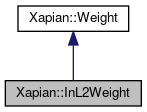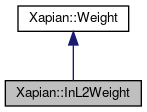This class implements the InL2 weighting scheme. More...
#include <weight.h>
 Inheritance diagram for Xapian::InL2Weight:
Inheritance diagram for Xapian::InL2Weight: Collaboration diagram for Xapian::InL2Weight:
Collaboration diagram for Xapian::InL2Weight:Public Member Functions | |
| InL2Weight (double c) | |
| Construct an InL2Weight. More... | |
| InL2Weight () | |
| std::string | name () const |
| Return the name of this weighting scheme. More... | |
| std::string | serialise () const |
| Return this object's parameters serialised as a single string. More... | |
| InL2Weight * | unserialise (const std::string &serialised) const |
| Unserialise parameters. More... | |
| double | get_sumpart (Xapian::termcount wdf, Xapian::termcount doclen, Xapian::termcount uniqterms) const |
| Calculate the weight contribution for this object's term to a document. More... | |
| double | get_maxpart () const |
| Return an upper bound on what get_sumpart() can return for any document. More... | |
| double | get_sumextra (Xapian::termcount doclen, Xapian::termcount uniqterms) const |
| Calculate the term-independent weight component for a document. More... | |
| double | get_maxextra () const |
| Return an upper bound on what get_sumextra() can return for any document. More... | |
 Public Member Functions inherited from Xapian::Weight Public Member Functions inherited from Xapian::Weight | |
| Weight () | |
| Default constructor, needed by subclass constructors. More... | |
| virtual | ~Weight () |
| Virtual destructor, because we have virtual methods. More... | |
Private Member Functions | |
| InL2Weight * | clone () const |
| Clone this object. More... | |
| void | init (double factor) |
| Allow the subclass to perform any initialisation it needs to. More... | |
Private Attributes | |
| double | param_c |
| The wdf normalization parameter in the formula. More... | |
| double | upper_bound |
| The upper bound on the weight a term can give to a document. More... | |
| double | wqf_product_idf |
| The constant values which are used on every call to get_sumpart(). More... | |
| double | c_product_avlen |
Additional Inherited Members | |
 Public Types inherited from Xapian::Weight Public Types inherited from Xapian::Weight | |
| enum | type_smoothing { TWO_STAGE_SMOOTHING = 1 , DIRICHLET_SMOOTHING = 2 , ABSOLUTE_DISCOUNT_SMOOTHING = 3 , JELINEK_MERCER_SMOOTHING = 4 , DIRICHLET_PLUS_SMOOTHING = 5 } |
| Type of smoothing to use with the Language Model Weighting scheme. More... | |
 Protected Types inherited from Xapian::Weight Protected Types inherited from Xapian::Weight | |
| enum | stat_flags { COLLECTION_SIZE = 1 , RSET_SIZE = 2 , AVERAGE_LENGTH = 4 , TERMFREQ = 8 , RELTERMFREQ = 16 , QUERY_LENGTH = 32 , WQF = 64 , WDF = 128 , DOC_LENGTH = 256 , DOC_LENGTH_MIN = 512 , DOC_LENGTH_MAX = 1024 , WDF_MAX = 2048 , COLLECTION_FREQ = 4096 , UNIQUE_TERMS = 8192 , TOTAL_LENGTH = COLLECTION_SIZE | AVERAGE_LENGTH } |
| Stats which the weighting scheme can use (see need_stat()). More... | |
 Protected Member Functions inherited from Xapian::Weight Protected Member Functions inherited from Xapian::Weight | |
| void | need_stat (stat_flags flag) |
| Tell Xapian that your subclass will want a particular statistic. More... | |
| Weight (const Weight &) | |
| Don't allow copying. More... | |
| Xapian::doccount | get_collection_size () const |
| The number of documents in the collection. More... | |
| Xapian::doccount | get_rset_size () const |
| The number of documents marked as relevant. More... | |
| Xapian::doclength | get_average_length () const |
| The average length of a document in the collection. More... | |
| Xapian::doccount | get_termfreq () const |
| The number of documents which this term indexes. More... | |
| Xapian::doccount | get_reltermfreq () const |
| The number of relevant documents which this term indexes. More... | |
| Xapian::termcount | get_collection_freq () const |
| The collection frequency of the term. More... | |
| Xapian::termcount | get_query_length () const |
| The length of the query. More... | |
| Xapian::termcount | get_wqf () const |
| The within-query-frequency of this term. More... | |
| Xapian::termcount | get_doclength_upper_bound () const |
| An upper bound on the maximum length of any document in the shard. More... | |
| Xapian::termcount | get_doclength_lower_bound () const |
| A lower bound on the minimum length of any document in the shard. More... | |
| Xapian::termcount | get_wdf_upper_bound () const |
| An upper bound on the wdf of this term in the shard. More... | |
| Xapian::totallength | get_total_length () const |
| Total length of all documents in the collection. More... | |
Detailed Description
This class implements the InL2 weighting scheme.
InL2 is a representative scheme of the Divergence from Randomness Framework by Gianni Amati.
This weighting scheme is useful for tasks that require early precision.
It uses the Inverse document frequency model (In), the Laplace method to find the aftereffect of sampling (L) and the second wdf normalization proposed by Amati to normalize the wdf in the document to the length of the document (H2).
For more information about the DFR Framework and the InL2 scheme, please refer to: Gianni Amati and Cornelis Joost Van Rijsbergen Probabilistic models of information retrieval based on measuring the divergence from randomness ACM Transactions on Information Systems (TOIS) 20, (4), 2002, pp. 357-389.
Constructor & Destructor Documentation
◆ InL2Weight() [1/2]
|
explicit |
Construct an InL2Weight.
- Parameters
-
c A strictly positive parameter controlling the extent of the normalization of the wdf to the document length. The default value of 1 is suitable for longer queries but it may need to be changed for shorter queries. For more information, please refer to Gianni Amati's PHD thesis.
Definition at line 34 of file inl2weight.cc.
References Xapian::Weight::AVERAGE_LENGTH, Xapian::Weight::COLLECTION_SIZE, Xapian::Weight::DOC_LENGTH, Xapian::Weight::DOC_LENGTH_MIN, Xapian::Weight::need_stat(), param_c, Xapian::Weight::TERMFREQ, Xapian::Weight::WDF, Xapian::Weight::WDF_MAX, and Xapian::Weight::WQF.
◆ InL2Weight() [2/2]
|
inline |
Definition at line 870 of file weight.h.
Referenced by clone(), and unserialise().
Member Function Documentation
◆ clone()
|
privatevirtual |
Clone this object.
This method allocates and returns a copy of the object it is called on.
If your subclass is called FooWeight and has parameters a and b, then you would implement FooWeight::clone() like so:
FooWeight * FooWeight::clone() const { return new FooWeight(a, b); }
Note that the returned object will be deallocated by Xapian after use with "delete". If you want to handle the deletion in a special way (for example when wrapping the Xapian API for use from another language) then you can define a static operator delete method in your subclass as shown here: https://trac.xapian.org/ticket/554#comment:1
Implements Xapian::Weight.
Definition at line 50 of file inl2weight.cc.
References InL2Weight(), and param_c.
◆ get_maxextra()
|
virtual |
Return an upper bound on what get_sumextra() can return for any document.
This information is used by the matcher to perform various optimisations, so strive to make the bound as tight as possible.
Implements Xapian::Weight.
Definition at line 140 of file inl2weight.cc.
◆ get_maxpart()
|
virtual |
Return an upper bound on what get_sumpart() can return for any document.
This information is used by the matcher to perform various optimisations, so strive to make the bound as tight as possible.
Implements Xapian::Weight.
Definition at line 128 of file inl2weight.cc.
References upper_bound.
◆ get_sumextra()
|
virtual |
Calculate the term-independent weight component for a document.
The parameter gives information about the document which may be used in the calculations:
- Parameters
-
doclen The document's length (unnormalised). uniqterms The number of unique terms in the document.
Implements Xapian::Weight.
Definition at line 134 of file inl2weight.cc.
◆ get_sumpart()
|
virtual |
Calculate the weight contribution for this object's term to a document.
The parameters give information about the document which may be used in the calculations:
- Parameters
-
wdf The within document frequency of the term in the document. doclen The document's length (unnormalised). uniqterms Number of unique terms in the document (used for absolute smoothing).
Implements Xapian::Weight.
Definition at line 114 of file inl2weight.cc.
References c_product_avlen, log2(), and wqf_product_idf.
◆ init()
|
privatevirtual |
Allow the subclass to perform any initialisation it needs to.
- Parameters
-
factor Any scaling factor (e.g. from OP_SCALE_WEIGHT). If the Weight object is for the term-independent weight supplied by get_sumextra()/get_maxextra(), then init(0.0) is called (starting from Xapian 1.2.11 and 1.3.1 - earlier versions failed to call init() for such Weight objects).
Implements Xapian::Weight.
Definition at line 56 of file inl2weight.cc.
References c_product_avlen, Xapian::Weight::get_average_length(), Xapian::Weight::get_collection_size(), Xapian::Weight::get_doclength_lower_bound(), Xapian::Weight::get_termfreq(), Xapian::Weight::get_wdf_upper_bound(), Xapian::Weight::get_wqf(), log2(), param_c, upper_bound, and wqf_product_idf.
◆ name()
|
virtual |
Return the name of this weighting scheme.
This name is used by the remote backend. It is passed along with the serialised parameters to the remote server so that it knows which class to create.
Return the full namespace-qualified name of your class here - if your class is called FooWeight, return "FooWeight" from this method (Xapian::BM25Weight returns "Xapian::BM25Weight" here).
If you don't want to support the remote backend, you can use the default implementation which simply returns an empty string.
Reimplemented from Xapian::Weight.
Definition at line 91 of file inl2weight.cc.
◆ serialise()
|
virtual |
Return this object's parameters serialised as a single string.
If you don't want to support the remote backend, you can use the default implementation which simply throws Xapian::UnimplementedError.
Reimplemented from Xapian::Weight.
Definition at line 97 of file inl2weight.cc.
References param_c, and serialise_double().
◆ unserialise()
|
virtual |
Unserialise parameters.
This method unserialises parameters serialised by the serialise() method and allocates and returns a new object initialised with them.
If you don't want to support the remote backend, you can use the default implementation which simply throws Xapian::UnimplementedError.
Note that the returned object will be deallocated by Xapian after use with "delete". If you want to handle the deletion in a special way (for example when wrapping the Xapian API for use from another language) then you can define a static operator delete method in your subclass as shown here: https://trac.xapian.org/ticket/554#comment:1
- Parameters
-
serialised A string containing the serialised parameters.
Reimplemented from Xapian::Weight.
Definition at line 103 of file inl2weight.cc.
References InL2Weight(), rare, and unserialise_double().
Member Data Documentation
◆ c_product_avlen
|
private |
Definition at line 853 of file weight.h.
Referenced by get_sumpart(), and init().
◆ param_c
|
private |
The wdf normalization parameter in the formula.
Definition at line 846 of file weight.h.
Referenced by clone(), init(), InL2Weight(), and serialise().
◆ upper_bound
|
private |
The upper bound on the weight a term can give to a document.
Definition at line 849 of file weight.h.
Referenced by get_maxpart(), and init().
◆ wqf_product_idf
|
private |
The constant values which are used on every call to get_sumpart().
Definition at line 852 of file weight.h.
Referenced by get_sumpart(), and init().
The documentation for this class was generated from the following files:
- include/xapian/weight.h
- weight/inl2weight.cc

